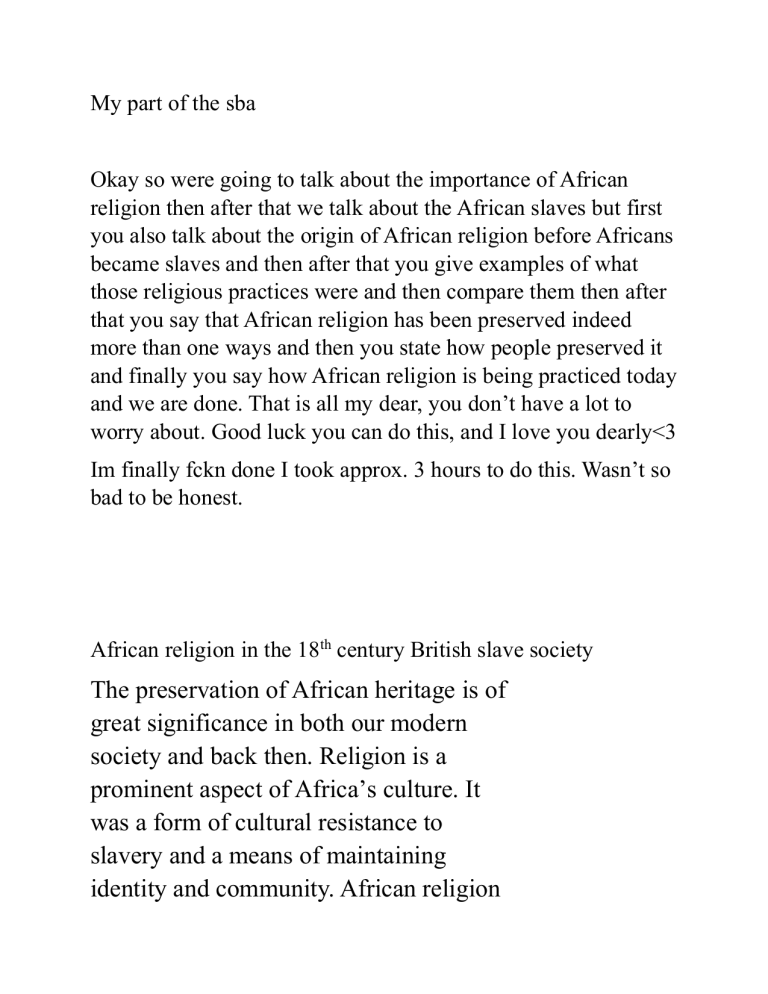
My part of the sba Okay so were going to talk about the importance of African religion then after that we talk about the African slaves but first you also talk about the origin of African religion before Africans became slaves and then after that you give examples of what those religious practices were and then compare them then after that you say that African religion has been preserved indeed more than one ways and then you state how people preserved it and finally you say how African religion is being practiced today and we are done. That is all my dear, you don’t have a lot to worry about. Good luck you can do this, and I love you dearly<3 Im finally fckn done I took approx. 3 hours to do this. Wasn’t so bad to be honest. African religion in the 18th century British slave society The preservation of African heritage is of great significance in both our modern society and back then. Religion is a prominent aspect of Africa’s culture. It was a form of cultural resistance to slavery and a means of maintaining identity and community. African religion throughout Africa herself is diverse and varied, there are many doctrines, beliefs, and practices. Although each religion had their own ideologies, they all shared common grounds. It was anthologized by the author of the Historical Review, k. Sambol-Tosco, that a number of these religious groups in Africa believed in the afterlife or reincarnation, communalism, and a supreme being to whom they would pray and offer sacrifices (K.SambolTosco 2004). The cataclysmic event, that is the trans-Atlantic slave trade, prompted the then enslaved to fiercely hold on to their faith and hope for better days to come. During these inhumane hardships on the plantations, the slaves used their religious beliefs to stay strong and to resist the planters’ allegations. On the sugar estates in the Caribbean, emerged a pluralist society. The religions practiced include: Myalism and Obeah, Voodoo, Yoruba, Santeria, pocomania and forcibly Christianity. The enslaved Africans were constantly targeted by the planters for more reasons than one. Whenever they tried to accumulate and practice their religion, whether they danced, sang, drummed, or even telling stories, the planters always found a way to suppress their culture whether by threatening them or inflicting pain and maiming them. It was enough that they had taken them away from their homeland, forcibly for domestication, now they could not even practice their way of life on the plantations. They were coerced to practice a new religion, that is Christianity. An unquestionable obstacle to the acceptance of Christianity among slaves was their desire to continue to adhere as much as possible to the religious beliefs and rituals of their African ancestors. Despite the oppressive conditions, enslaved individuals managed to keep the elements of their beliefs alive through stories, healing arts, and songs. African religion survived and evolved in the Caribbean over time, with Christianity, Obeah, Voodoo, Pocomania, Yoruba, Revivalism, and other practices being adapted into the lives of the descendants of Africans. In modern society, African religion has been adapted to various aspects of life, and its significance is undeniable. Although the singing and dancing aspect of African religion has been altered over time, the core principles and beliefs have remained constant. In Jamaica the prevalent religion is Christianity, though there is a diverse range of religions practiced in Jamaica, Christianity is seen as the most dominant. In Haiti, the predominant religion is voodoo, likewise, there are many more religions practiced, voodoo is however the most prevalent. The singing and dancing aspect of the African religion is still practiced in all parts of the Caribbean. To further emphasize how much of Africa’s religious culture is integrated in society today, an annual carnival is held in Trinidad, it signifies the end of slavery and survival of our culture. It is a gathering of thousands of people who are dressed in rather kaleidoscopic clothing as well as costumes, dancing through the parade routes to the exhilarating sounds of Soca, steelpan, and calypso music which were also a method of worship. This goes to prove that Africa’s heritage and religion has been deeply engraved into modern day society.


